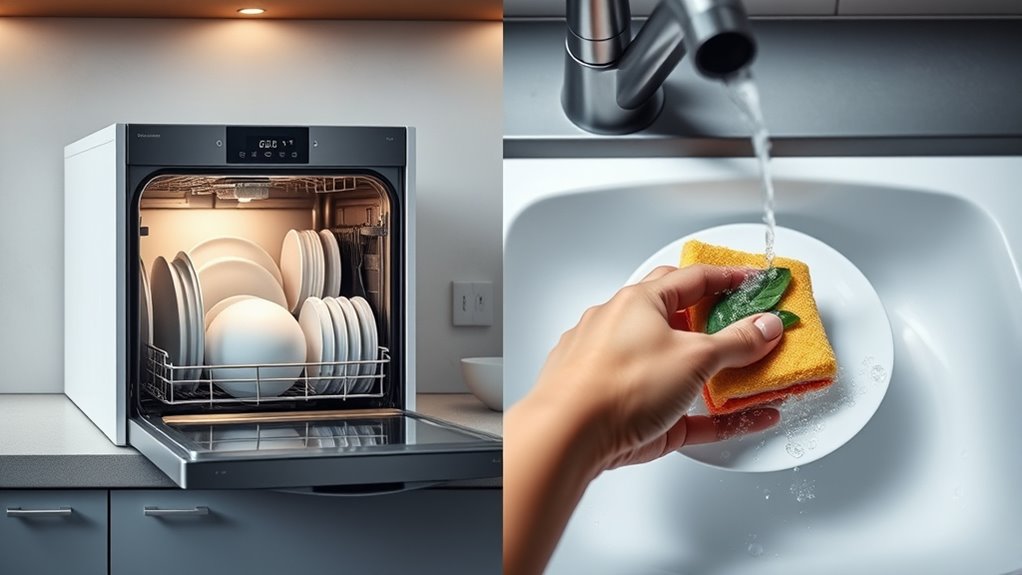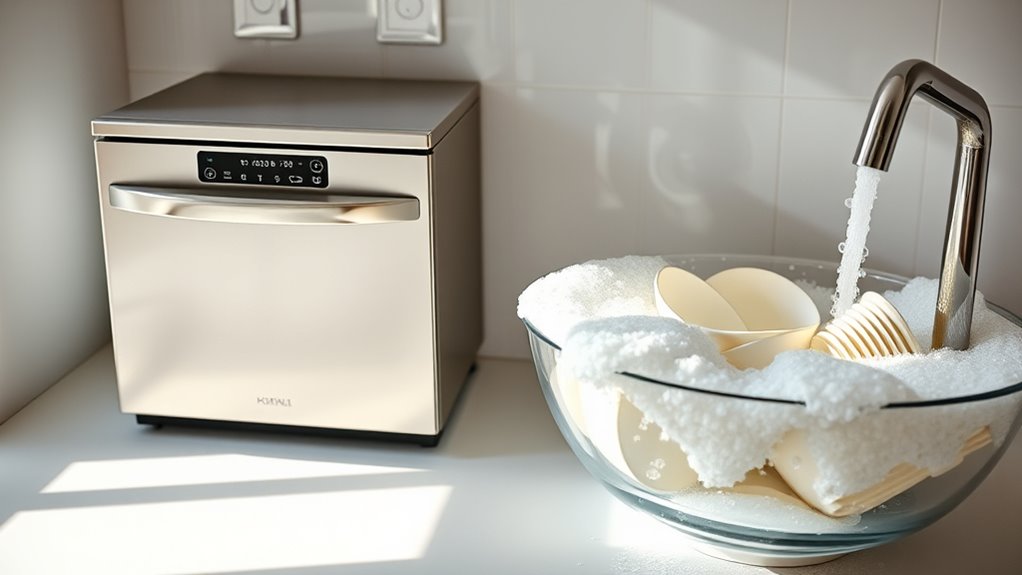Countertop dishwashers typically save more water than hand washing because they use a set amount of water per load, reducing waste. While hand washing can waste a lot of water if you rinse continuously, a dishwasher circulates water efficiently and targets each dish. If you want to learn how these appliances help conserve resources and cut costs without sacrificing cleanliness, keep exploring further.
Key Takeaways
- Countertop dishwashers use a set amount of water per cycle, often less than continuous hand rinsing.
- Hand washing can consume more water if rinsing runs under a tap for extended periods.
- Modern countertop dishwashers feature sensors and eco-settings that optimize water use efficiently.
- Hand washing relies on user technique, which may lead to higher water waste without careful control.
- Overall, countertop dishwashers tend to save more water while providing consistent cleaning results.

When it comes to cleaning dishes, you might wonder whether a countertop dishwasher or hand washing is the better option. Both methods have their advantages, but if you’re focused on water conservation, understanding their differences is essential. Countertop dishwashers are designed to be compact yet efficient, often using less water per load compared to hand washing. These machines typically operate with a set amount of water that circulates through the dishes, ensuring thorough cleaning while minimizing waste. Hand washing, on the other hand, can be less consistent—if you’re not mindful, you might use more water than necessary, especially when rinsing dishes under running water for extended periods.
Countertop dishwashers use less water and ensure consistent, efficient cleaning compared to hand washing.
In terms of energy efficiency, countertop dishwashers tend to use less energy overall because they are engineered to optimize water and power consumption. Modern models often feature eco-friendly settings that further reduce their environmental footprint. They heat only the water needed for each cycle and use sensors to adjust water levels based on load size, making them more efficient than washing by hand, where hot water is often left running longer than necessary. When you opt for a countertop dishwasher, you’re not only saving water but also reducing your energy bills, since less hot water means less energy used to heat it.
Cleaning effectiveness is another key factor. Countertop dishwashers are designed to deliver consistent, high-quality cleaning results thanks to their spray arms and specialized detergents. They reach every surface, removing stubborn stains and bacteria more reliably than hand washing, which depends heavily on your technique. Hand washing can be effective if you’re thorough, but inconsistent rinsing and scrubbing can leave residue or germs behind. Plus, hand washing often requires you to rewash items that aren’t cleaned properly the first time, leading to more water and energy use overall.
While hand washing gives you control over water flow and temperature, it’s easier to waste both without careful attention. Countertop dishwashers, however, incorporate smart features that automatically regulate water and energy use, making them a smarter choice for conserving resources. Additionally, some models include sensors to optimize water use, further enhancing their efficiency. If you’re looking for a method that balances cleaning effectiveness with water and energy savings, a countertop dishwasher can be a practical solution. It’s designed to do the job thoroughly while using fewer resources, helping you reduce your environmental impact without sacrificing cleanliness.
Frequently Asked Questions
Do Countertop Dishwashers Use More Electricity Than Hand Washing?
You might wonder if countertop dishwashers use more electricity than hand washing. Generally, they have lower energy consumption because they run efficiently, focusing on water and energy savings. This makes them more cost-efficient over time, especially if you wash fewer dishes at once. Hand washing can use more energy if you keep running warm water, but countertop dishwashers are designed for ideal energy use, saving you money and reducing your environmental impact.
How Long Does a Countertop Dishwasher Take Compared to Hand Washing?
A countertop dishwasher typically takes about 1 to 2 hours per cycle, depending on the program chosen. In contrast, hand washing your dishes might take 15 to 30 minutes, but it varies based on your efficiency. While dishwasher cycle duration is longer, it often uses less water than hand washing, which can be more time-consuming and water-intensive if you’re not careful. So, consider your time and water use when choosing.
Are Countertop Dishwashers Suitable for Large Families?
Did you know many countertop dishwashers can handle up to 6 place settings? For large families, this capacity might feel limited. If your family size involves frequent big loads, you may find countertop models less practical. While they’re perfect for small households or quick tasks, their appliance capacity may not meet the demands of larger families. Consider a full-size dishwasher if you need more space for frequent, large loads.
Can Countertop Dishwashers Handle Heavy or Greasy Pots and Pans?
You might wonder if a countertop dishwasher can handle heavy pots and greasy pans. Typically, these small machines are designed for lighter loads, so cleaning very heavy or greasy items may be challenging. You’ll likely need to scrub stubborn grease or use a pre-rinse to guarantee proper cleaning. While convenient for everyday dishes, they might not be the best choice for thoroughly washing large, heavily soiled cookware.
What Are the Maintenance Costs Associated With Countertop Dishwashers?
When considering countertop dishwashers, you should know that maintenance expenses are generally low, but repair costs can add up if parts wear out or break. You’ll need to regularly clean filters and check hoses to keep it running efficiently. While routine upkeep is simple, unexpected repair costs could be higher, especially if you delay addressing issues. Overall, staying proactive helps minimize expenses and prolongs your dishwasher’s lifespan.
Conclusion
In the battle between countertop dishwashers and hand washing, it’s clear that choosing the right method can save you water and time. Modern countertop dishwashers are more efficient, much like the trusty automaton from a steampunk novel, conserving water with each cycle. So, next time you’re cleaning up, consider upgrading your kitchen routine—your planet and your water bill will thank you. Embrace the future of dishwashing, and let efficiency be your guiding star.









